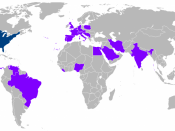This article explains what is meant by escalation of commitment and how is it that individuals can become locked into a decision or course of action. The article begins by mentioning that the most difficult decision an individual has to make is whether to cease a risky behavior or to continue putting more effort and time into it in the hope that it will work or pay off in the end. The author then gives examples of how the escalation of commitment can significantly affect the decisions taken by individuals, organizations and even governments.
The Fallible Decision Maker
The article then tackles the issue of decisional errors, that is making errors in decisions making. The author mentions that according to psychological literature, there are two primary ways for explaining errors in decision making. The first one refers to the personal limitations. In other words, decisional errors can be explained in terms of the limited ability of individuals to process information, to dig into the different alternatives, to analyze the pros and cons of each alternative and to dig for information in their memories.
The second way of explaining decisional errors is in terms of interpersonal elements such as social power or group dynamics. In other words, social interactions with people can hinder rational decision making. The article adds that economic rationality implies that actions or decisions can be entered into when future benefits outweigh future costs, excluding past losses from the equation if they are not expected to recur.
Self-Justification in Commitment Decisions
The article then talks about self-justification for commitment decisions. The author then presents a case study of a group of business students who were asked to allocate funds to one of two divisions of a company. The results of the study supported the expectation that administrators seek...


